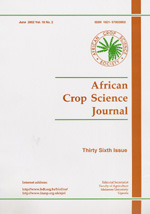
|
African Crop Science Journal
African Crop Science Society
ISSN: 1021-9730
EISSN: 1021-9730
Vol. 20, No. s2, 2012, pp. 409-423
|
 Bioline Code: cs12055
Bioline Code: cs12055
Full paper language: English
Document type: Research Article
Document available free of charge
|
|
|
African Crop Science Journal, Vol. 20, No. s2, 2012, pp. 409-423
| en |
ARODOKOUN, U.; DEDEHOUANOU, H.; ADEOTI, R.; ADEGBOLA, P.; ADEKAMBI, S. & KATARY, A.
Abstract
The present study analysed the influence of the ICT use and socio-economic characteristics of agricultural
households on the adaptation of smallholder farmers to climate change in Benin. A multinomial choice model,
suitable to data from a quantitative survey on 121 cotton producers selected from 6 villages of central Benin has
been used in this study. Twenty-three adaptation strategies from cross-sectional studies and refined in the study
area through a qualitative study phase were subjected to analysis. Results indicate that ‘late sowings’, and
‘repeated sowing’ are the most effective strategies developed by cotton producers to adapt to climate variability.
Collective practices are also developed as preventive and curative strategies to situations of
delay, scarcity, abundance of rain and pockets of drought. It’s about strategies highly worship and
based on ‘Sacrifices to the gods’, ‘collective prayers’ and ‘village meetings to raise awareness for the respect
of social taboos’. Several variables influence the adoption of different adaptation strategies. These include the producer’s level of education, his age and correlatively his experience in cotton production, the area of residence,
the way of accessing to land, the area of land used for cotton cultivation and the number of
ICT parks used. All actions whose purpose is to improve the resilience of African agriculture to climate change
must dwell primarily on strategies for updating sowing dates and new agricultural calendar based on the disruption
of crop seasons. Government policies and international adaptation programs should focus on education,
facilitating farmers’ access to ICT. Different interventions should be done according to centered approaches on
actors and production systems.
Keywords
Climate change, ICT, cotton producers, production system, adaptation strategies, determinants, Central-Benin
|
| |
| fr |
RÔLE DES NTIC DANS L’ADAPTATION AUX CHANGEMENTS CLIMATIQUES PAR LES PRODUCTEURS DE COTON DU CENTRE - BÉNIN
ARODOKOUN, U.; DEDEHOUANOU, H.; ADEOTI, R.; ADEGBOLA, P.; ADEKAMBI, S. & KATARY, A.
Résumé
La présente étude a analysé l’influence de l’usage des NTIC et des caractéristiques socio économiques des
ménages agricoles sur l’adaptation des petits agriculteurs béninois face aux changements climatiques. Elle a utilisé
un modèle de choix multinomial adapté aux données issues d’une enquête quantitative sur 121 producteurs de
coton répartis dans 6 villages du Centre-Bénin. Vingt trois stratégies d’adaptation issues d’études transversales
et affinées dans la zone d’étude par une phase d’étude qualitative ont fait objet d’analyse. Les résultats indiquent
que ‘les semis tardifs’ et respectivement les ‘semis répétés’ sont les stratégies les plus développées par les
producteurs de coton pour s’adapter à la variabilité climatique. Aussi des pratiques collectives sont développées
en guise de stratégies préventives et curatives aux situations de retard, de rareté, d’abondance des pluies, et de
poches de sécheresses. Il s’agit de stratégies fortement cultuelles basées sur les ‘Sacrifices aux divinités’, ‘les
prières collectives’ et‘ les assemblées villageoises de sensibilisation pour le respect des interdits sociaux’. Plusieurs
variables influencent l’adoption des différentes stratégies d’adaptation. Il s’agit notamment du niveau d’instruction
du producteur, son âge et corrélativement son expérience dans la production de coton, sa zone de résidence, son
mode d’accès au foncier, la superficie de coton qu’il cultive et le nombre de parc NTIC dont il fait usage. Toutes
actions ayant pour finalité d’améliorer la résilience de l’agriculture africaine aux changements climatiques doit
s’appesantir en premier lieu sur les stratégies d’actualisation des dates de semis et du nouveau calendrier agricole
en fonction de la perturbation des saisons de cultures. Les politiques gouvernementales et programmes internationaux
d’adaptation doivent se focaliser sur l’éducation, la facilitation de l’accès des producteurs aux TIC. Les différentes
interventions devront se faire suivant des approches centrées sur les acteurs et sur les systèmes de production.
Mots Clés
Changements climatiques, NTIC, producteurs de coton, système de production, stratégies d’adaptation, déterminants, Centre-Bénin
|
| |
© Copyright 2012 - African Crop Science Society
|
|
